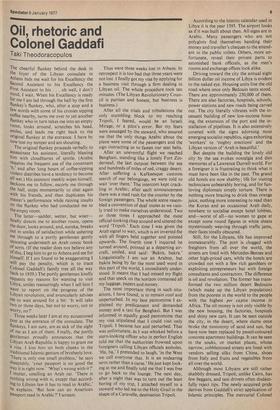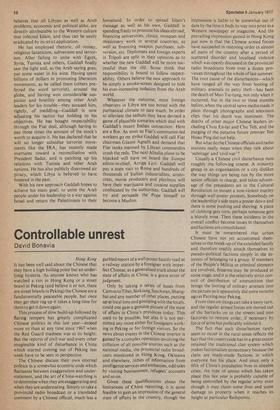Oil, rhetoric and Colonel Gaddafi
Taki Theodoracopulos
The cheerful flunkey behind the desk in the foyer of the Libyan consulate in Athens bids me wait for his Excellency the Second Assistant to his Excellency the First Assistant to his . . oh well, I don't mind, I wait. When his Excellency is ready for me am led through the hall by the first flunkey's flunkey, who, after a stop and a few words with some of his cronies sipping coffee nearby, turns me over to yet another flunkey who in turn takes me into an empty room, looks around, scratches his head, smiles, and leads me right back to the original flunkey at the entrance. 1 have by now lost my temper and am shouting.
The original flunkey proceeds verbally to assassinate his assistant, literally blasting him with cloudbursts of spittle. (Arabic requires the frequent use of the consonant h,' and after long hours of coffee-sipping violent diatribes have a tendency to become all wet.) His assistant meekly wipes himself, beckons me to follow, escorts me through the hall, stops momentarily to chat again With his friends, and then duplicates his Master's performance while raining insults O n the flunkey who had conducted me to the empty room.
The latter—sadder, wetter, but wiser— finally directs me to another room, opens the door, looks around, and, eureka, breaks out in smiles of satisfaction while ushering me through to a portly gentleman gently snoozing underneath an Arab comic book Of sorts. (If the reader does not believe any of this, [beg him to go to Athens and see for himself. If I am found to be exaggerating I Will pay the penalty, which is to trace Colonel Gaddafi's family tree all the way back to 1939.) The portly gentleman kindly requests my reasons for wanting to visit Libya, smiles reassuringly when I tell him I want to report on the progress of the Libyan revolution, and avuncularly advises me to wail around for a bit: 'It will take two or three days, but not to worry, not to worry, no ?'
Three weeks later I am at my accustomed Post at the entrance of the consulate. The flunkeys, I am sure, are as sick of the sight of me as I am of them. Finally, the portly gentlernan proudly announces that the Libyan Arab Republic is happy to grant me a visa. I kiss him on both cheeks in the traditional Islamic gesture of brotherly love. There is only one small problem,' he says sheepishly, `your passport is no good the Way it is right now.—What's wrong with it ?' I stutter, smelling an Arab rat. 'There is nothing wrong with it, except that according to Libyan law it has to read in Arabic,' he explains. 'But how can an American Passport read in Arabic?' I scream.
Thus were three weeks lost in Athens. In retrospect it is too bad that three years were not lost. I finally got my visa by applying for a business visit through a firm dealing in Libyan oil. The whole procedure took ten minutes. (The Libyan Revolutionary Council is puritan and honest, but business is business.) After all the trials and tribulations the only stumbling block to my reaching Tripoli, I feared, would be an Israeli Mirage, or a pilot's error. But my fears were assuaged by the steward, who assured me that the only things Arabic about the plane were some of the passengers and the sign instructing us to fasten our seat belts.
After an uneventful flight we reached Benghazi, standing like a lonely Fort Zinderneuf, the last outpost between the sea and hundreds of miles of red, craggy desert. After suffering a Kafkaesque customs search of our belongings, we were told to wait 'over there.' The intercom kept crackling in Arabic; after each announcement there was a mad rush for the counter by the foreign passengers. The whole scene resembled a convention of deaf mutes as we vainly tried to make ourselves understood. Two or three times I approached the most official-looking chap around and uttered the word 'Tripoli.' Each time I was given the Arab signal to wait, which is an inverted fist with all fingers held together and pointed upwards. The fourth time I inquired he turned around, pointed at a departing aircraft, smiled, and said: 'Bukra, bukra.' Linguistically I am not an Arabist, but bukra being by far the most used word in this part of the world, I immediately understood. It meant that I had missed my flight and that speck on the horizon contained all my luggage, papers and money.
The most important thing in such situations, I have found, is to remain cool and unperturbed. In my best pantomime I explained my predicament and demanded money and a taxi for Benghazi. But I was informed in equally good pantomime that my visa stipulated that 1 could visit only Tripoli. I became hot and perturbed. That was unfortunate, as I was whisked before a stern-looking officer who in perfect English told me that the authorities frowned upon foreigners calling Libyan officials assholes. 'Ha, ha,' I pretended to laugh, 'in the West we call everyone that. It is an endearing term rather than a curse.' He just kept looking at me and finally told me that I was free to go back to the lounge. The next day, after a night that was to turn out the least boring of my trip, I attached myself to a steward who led me to the Holy Grail in the shape of a Caravelle, destination Tripoli. According to the Islamic calendar used in Libya it is the year 1395. The airport looks as if it was built about then. All signs are in Arabic. Many passengers who are not polyglots find themselves handing their money and traveller's cheques to the attendant in the public toilets. Others, more unfortunate, reveal their private parts to astonished bank officials, as the men's rooms and exchange offices look alike.
Driving toward the city the annual eight billion dollar oil income of Libya is evident to the naked eye. Housing units line the old road where once only Bedouin tents stood. There are approximately 250,000 of them. There are also factories, hospitals, schools, power stations and new roads being carved out. The city literally vibrates with the incessant building of new low-income housing, the extension of the port and the installation of pipelines. It is also extensively covered with the signs adorning most emerging socialist republics, signs exhorting 'workers' to 'mighty erections' and the Libyan version of 'Arab is beautiful.'
But despite the building the lovely old city by the sea evokes nostalgia and dim memories of a Lawrence Durrell world. For a foreigner it is frustrating to think what it must have been like in the past. The grand old hotels are now shabby; life for visiting technicians unbearably boring, and for funloving diplomats simply torture. There is nothing more bracing to drink than orange juice, nothing more interesting to read than the Koran and an occasional Arab daily, nowhere to socialise except hotel lobbies, and—worst of all—no women to gape at except some round figures in white sheets mysteriously weaving through traffic jams, their faces totally obscured.
Still, for the Libyans, life has improved immeasurably. The port is clogged with freighters from all over the world, the streets are lined with Mercedes-Benzes and other high-priced cars, while the hotels are crowded not with a few rich gamblers or exploiting entrepreneurs but with foreign consultants and contractors. The difference is oil and revolution. The former has transformed the two million desert Bedouins (which make up the Libyan population) from the poorest in the world to the people with the highest per capita income in Africa. The oil money is not only visible by the new housing, the factories, hospitals and shiny new cars. It can be seen outside the city, in the desert, where slums once broke the monotony of sand and sun, but have now been replaced by pastel-coloured concrete apartment buildings. It can be seen in the souks, or market places, whose narrow, cobblestoned streets are lined with vendors selling silks from China, shoes from Italy and fruits and vegetables from all over the world.
Although most Libyans are still rather shabbily dressed, Tripoli, unlike Cairo, has few beggars, and taxi drivers often disdainfully reject tips. The newly acquired pride derives from Gaddafi's strict application of Islamic principles, The mercurial Colonel believes that all Libyan as well as Arab problems, economic and political alike, are directly attributable to the Western culture that infected Islam, and thus can be easily eradicated by its strict application.
He has employed rhetoric, oil money, religious fanaticism, subversion and terrorism. After failing to unite with Egypt, Syria, Tunisia and others, Gaddafi finally saw the light and, as the Arab saying goes, put some water in his wine. Having spent billions of dollars in promoting liberation movements, as he called them (others preferred the word terrorist), around the globe, and having won considerable suspicion and hostility among other Arab leaders for his trouble—they accused him, rightly, of meddling—Gaddafi is now adjusting his tactics' but holding to his objectives. He has bought respectability through the Fiat deal, although having to pay three times the amount of the stock's worth to acquire it. He has declared that he will no longer subsidise terrorist movements like the IRA, has recently made overtures toward a reconciliation with President Sadat, and is patching up his relations with Tunisia and other Arab nations. He has also publicly disavowed air piracy, which Libya is believed to have fostered in the past.
With his new approach Gaddafi hopes to achieve his main goal: to unite the Arab people under his leadership in a war against Israel and return the Palestinians to their homeland. In order to spread Islam's message as well as his own, Gaddafi is spending freely to promote his ideas abroad, financing universities, clinics, mosques and missionary work in several countries, as well as financing weapon purchases, subversion, etc. Diplomats and foreign experts in Tripoli are split in their opinions as to whether the new Gaddafi will be more successful than the old. Some think that responsibility is bound to follow respectability. Others believe the new approach to be simply a smoke-screen designed to hide his ever-increasing isolation from the Arab world.
Whatever the outcome, most foreign observers in Libya are too bored with the puritanical climate to care much. In order to alleviate the tedium they have devised a game of plausible scenarios which deal with Gaddafi's recent Italian connection. Here are a few. As soon as Fiat's communist-led workers go on strike Gaddafi will call Fiat chairman Gianni Agnelli and demand that Fiat tanks manned by Libyan commandos crush the reds. The next Alitalia plane to be hijacked will have on board the Stampa editor-in-chief, Arriga Levi. Gaddafi will pay a state visit to Rome and hundreds of thousands of Italian industrialists, aristocrats, movie producers and playboys will have their marijuana and cocaine supplies confiscated by the authorities. Gaddafi will try and persuade the Pope himself to become a Muslim.



































 Previous page
Previous page